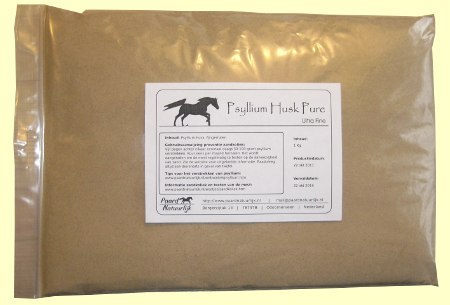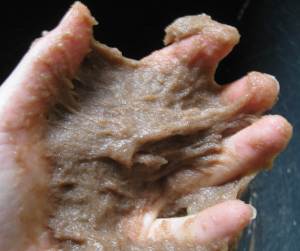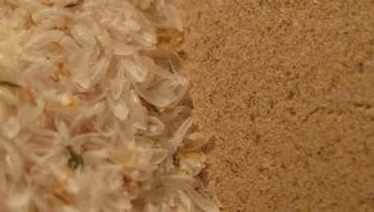Psyllium husk pure ultrafine Prevents sand colic

Our horses are kept outdoors throughout the winter, and are fed while outside. It's inevitable that they occasionally ingest some sand. Why this can be dangerous and why it’s wise to give horses Psyllium periodically is explained in our article on sand colic. In searching for Psyllium for our own horses, we discovered a wide variation in prices, types, and quality. Along the way, we also came across a lot of useful information about Psyllium. All of this led to the creation of this article — and the purchase of a batch of very high-quality Psyllium, which we can now offer at a competitive price in our webshop.
Psyllium
"Psyllium" usually refers to the (ground or whole) husks of the seeds of the "Psyllium plant". This plant, known by different names in different countries, only thrives in dry climates and does not grow naturally in the Netherlands. It is mostly cultivated in countries like India and Pakistan. The husks of these seeds have the interesting property of being indigestible and highly absorbent. As a result, they travel through the digestive system as a sticky mass. Interestingly, Psyllium helps both with constipation and diarrhoea. Most people give it to horses to help remove sand that may have accumulated in the intestines.

Contrary to popular belief, its sand-expelling action is not due to its sticky consistency, but rather its ability to bind water. The increased moisture in the intestines stimulates gut motility and improves flow, effectively flushing sand along with it. In our search for the best type of Psyllium, we tested various products to see how much water they could absorb — and the results varied significantly.
According to our test results, which were backed by a study from the Horse Journal ("Powder Fights Best Against Sand Colic"), finely ground Psyllium husk works better than whole seeds or husks. The finer the grind, the more effective it is. Unfortunately, most commercially available Psyllium is of the coarser type. But we wanted ultra-fine Psyllium — and managed to source it. The Psyllium we offer in our webshop is the finest and therefore the most effective available.
Health benefits
Many health benefits are attributed to Psyllium. However, scientific evidence for several of these uses is still lacking. Some of the claims should therefore be taken with caution.
One limitation is that Psyllium only works for a short period: initially it is barely digested (as there are few microorganisms in the gut that can break it down), but after about a week of continuous use, the gut flora adapts, and it is digested more easily... Once that happens, its special benefits are lost. After a break of about three to four weeks, the gut environment returns to baseline and Psyllium becomes effective again. This means Psyllium is only suitable for short-term courses.
- Sand-clearing action
- Many users and vets report that Psyllium helps clear sand from the intestines. Given its properties, we believe this claim is justified. It has also been demonstrated in a study.
- Glucose-regulating properties
- Some studies have shown that Psyllium helps reduce insulin spikes in horses with insulin resistance, particularly in horses fed concentrates alongside forage. We now know that insulin resistance is often caused by dietary mistakes, such as feeding grain-based feeds. These feeds release glucose rapidly due to their high starch and low fibre content. In such a feeding system, any added fibre can help slow glucose release. However, it’s unclear whether Psyllium provides the same benefits in horses already on a low-carbohydrate, high-fibre forage-only diet. Additionally, Psyllium is only effective in short courses, while insulin resistance is a chronic condition — so a short-lived improvement may not be very useful.
- Probiotic effect
- The fact that Psyllium’s effect fades after a week due to adaptation of the gut flora suggests it functions as a probiotic. But the microbes responsible for digesting Psyllium also decline quickly once supplementation stops. Whether these microbes serve any further useful role is unclear.
- Toxin removal
- Many products are wrongly credited with "detoxifying" properties. It’s true that sand is considered waste in the intestines, and Psyllium is effective in removing it. However, we are unaware of any other persistent waste substances that settle in the gut.
- Stool regulation
- This claim is certainly valid. Psyllium reduces diarrhoea by absorbing excess fluid, and it also softens overly hard droppings by retaining moisture. It acts as a stabiliser for stool consistency. However, its benefits diminish with long-term use. For short-term bouts of diarrhoea, though, it works very well.
All in all, Psyllium’s primary benefit remains its sand-clearing action — which is the main reason to give it to your horse periodically.
Psyllium Husk Pure Ultra Fine

Our Psyllium is different from the standard version: it is ground much more finely, giving the active compounds in the husks a significantly larger surface area to work with. You can easily see the difference by adding the same amount of water to equal volumes of standard Psyllium husk and our Psyllium Husk Pure Ultra Fine: one becomes a runny mush, while the Ultra Fine version forms a sticky ball that can absorb twice as much water.
Because it is so finely milled, our Psyllium is less "fluffy" than standard Psyllium. This means that for the same volume, our product weighs more. If you measure by weight, our Psyllium takes up less space — but binds more water, so you still end up with a similar amount of "slurry". Still with us? Either way, as supported by the Horse Journal study ("Powder Fights Best Against Sand Colic"), finely ground Psyllium husk is more effective.
Price comparisons are tricky, as usual: not only do effectiveness and density vary, but suppliers often have very different ideas about the appropriate dosage. A supplier who recommends a low dose appears cheaper, since the product lasts longer. Others suggest higher doses (or even ongoing maintenance doses, which are pointless) to sell more product. There is no universally accepted dosage guideline. We believe it is better to give a short course of a potent product than a long course of a weak or under-dosed one. After all, a horse’s intestines can hold over 100 litres, and a teaspoon of weak Psyllium is unlikely to make a big difference.
Usage and dosage

|
Serving tip for Psyllium:
|
It’s important to understand that the gut flora quickly adapts to Psyllium; microbes capable of digesting it multiply rapidly. Once it becomes digestible, its beneficial effects diminish. Therefore, Psyllium should be used in short courses. During a break, the levels of these microbes fall, making the next course just as effective.
The ideal approach is to give Psyllium for 5 consecutive days, followed by a break of 3 to 4 weeks. The daily amount depends on the horse and the situation, but it’s not overly critical. Experts typically recommend 50 to 100 grams per day for 5 days. Psyllium is non-toxic, and when in doubt, it’s better to give a little more than too little. It’s more effective to give more for 5 days than a smaller amount over 7 days. While some people are allergic to Psyllium, we’ve not seen this in horses — but it’s still wise to start with a moderate dose. If the horse tolerates it well, you can increase it.
Some suppliers recommend just one tablespoon, equal to about 10 grams of standard Psyllium. Considering a horse’s gut volume (100 litres!), we don’t think this is enough to be effective.
Note: Already used Psyllium from another supplier? Be aware that our Psyllium takes up less space for the same weight! Our Psyllium Husk Pure Ultra Fine is far denser than standard husks.
It’s best to first mix Psyllium with feed, then add water — otherwise, you’ll end up with clumps and "meatballs" that don’t mix well. Grass and alfalfa pellets are great carriers.
If the goal is to remove sand from the gut, it helps to know that it comes out in "batches". Sometimes you’ll see sand in the manure, sometimes not. Regardless of what you observe, complete the full 5-day course before drawing conclusions. For more on checking for sand in manure, see our article on sand colic. If a lot of sand appears in the droppings, you can extend the course by 2 days, but afterwards it’s best to take a break, otherwise the effectiveness will quickly fade. If you do find a lot of sand, it’s wise to take steps to reduce sand ingestion.
Order
Because the dosage isn’t critical, we don’t include a measuring scoop. Everyone has a spoon or cup at home! That way, you don’t pay for something unnecessary that would just be thrown away. (No scale? 100 grams of our Psyllium — loose, not packed — equals 200 ml, or a standard drinking glass.)
The resealable bag can be reused for our "manure test" to check for sand in droppings. You can also order extra empty bags with your Psyllium to get started with testing right away.
| Er ligt nog niets in je winkelwagen. |
Frequently Asked Questions
Is this Psyllium also suitable for humans?
This Psyllium is certified for human use, but Paard Natuurlijk is not certified for the processing, storage, or sale of human food supplements. We can therefore only sell this product as animal feed.
How long does this Psyllium keep?
Our Psyllium has a shelf life of five years, provided it is stored dry and sealed.
Why is this Psyllium so cheap?
We import our Psyllium directly and don’t use a sales or distribution network. This saves us money that would otherwise go to middlemen — and we pass those savings on to you with a top-quality product at a great price.
Why are the smaller packs more expensive than a big bale of Psyllium?
It’s all about labour. Compared to shipping one 25 kg bale, packing 25 smaller bags, folding 25 boxes, printing 25 labels, checking 25 addresses, etc., takes a lot more time — not to mention the extra packaging costs.
The bag is smaller than those from other suppliers. Is that correct?
Our Psyllium is much finer and contains less air. It weighs the same, but takes up less space.
Your recommended dose is higher than another supplier’s. Is your product less effective?
You can test our product’s effectiveness for yourself. We recommend the dose that we believe works best. A horse’s gut can hold up to 100 litres, and it’s not uncommon for a kilo of sand to be present. A teaspoon of Psyllium simply isn’t enough to make a difference. Of course, you’re free to adjust the dose to your own judgement.